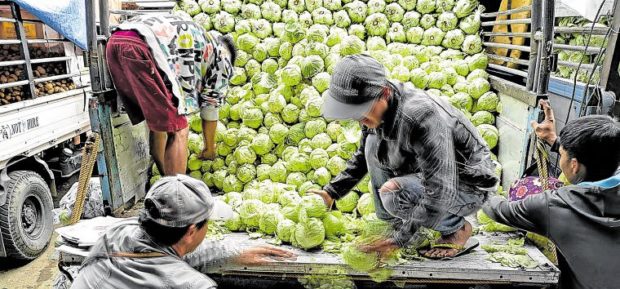
MANILA -BOUND Workers at La Trinidad trading station in Benguet Province load vegetables into a truck for transport to Metro Manila and nearby provinces. —INQUIRER FILE PHOTO
MANILA, Philippines — Ahead of the stringent two-week lockdown that will begin on Friday, the Department of Agriculture (DA) called for the unhampered transport of farm and fishery products to the metropolis and other areas to avoid pushing food prices up anew.
Agriculture Secretary William Dar said the agency would assist those who will encounter problems in the transport and delivery of food and agri-fishery commodities.
In March last year, local governments, driven by fear of coronavirus transmissions in their respective areas, turned away food trucks at checkpoints to the detriment of consumers.
This resulted in supply delays that eventually pushed prices up by as much as 46 percent.
“We will closely coordinate with the DILG (Department of the Interior and Local Government) and PNP to ensure the smooth flow of farm and fishery products to markets and finally to our respective dining tables,” Dar said.
“We will see to it that food supply lines are kept open, and ensure continuous delivery of major food items and temper prices,” he added.
‘Food passes’
The agriculture chief recently issued a set of guidelines directing its regional offices to facilitate the transport and delivery of food commodities. This includes the use of previously issued IATF IDs for agriculture known as “food passes,” which will allow the freeflow movement of cargos and trucks containing food, biologics, farm inputs and other materials essential to food production and distribution.
The DA said it would also issue new ones to those who weren’t able to secure food passes last year.
Upticks in vegetable prices
Price monitoring reports in Metro Manila markets prepared by the DA showed that prices of fish and meat have remained stable over the past week while vegetable prices were registering upticks.
For instance, a kilo of ampalaya, sitao, pechay and eggplant went up to an average of P100 a kilogram on Monday compared to quotations last week at P80 a kilo.
The highest increase was recorded in the price of garlic. From an average of P100 a kilo for both imported and local garlic, this has risen to as much as P300 a kilo.
Food prices are expected to move anew once the lockdown approaches, depending on the movement of goods, the availability of supply and whatever’s left of the Filipinos’ purchasing power.